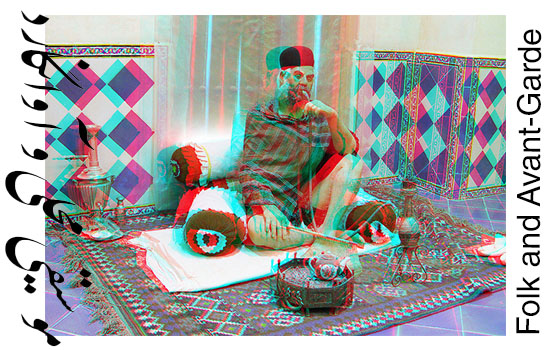Our mix this month presents a seemingly unorthodox combination: avant-garde and folk music from Iran and the region. The goal with this month’s podcast was to continue presenting samples of Iran’s many musical traditions in a multitude of forms to show the variety and ongoing development of Iran’s diverse folk music traditions.
Whereas surveys of Iranian music often overemphasize Persian cultural productions over that of other ethnic groups and essentialize traditions as unchanging and eternal, the sonic reality is far different. How better to move beyond these simplistic paradigms than with a mix showcasing the wide range of Iranian folk sounds and their modern interpretations?
For many years, nationalist discourses have equated all things Iranian with all things Persian, even as Iran is home to many ethnic and linguistic groups. As other articles have discussed, this ethnocentrism has had ramifications in the musical world, in the religious domain, and beyond. Similarly Iran’s various cultural productions have often been essentialized and understood as static by outsiders, as if Iranian created an ancient culture millenia ago and have been sitting around playing backgammon since. In reality, Iran is home to a variety of musical traditions with many languages, dialects, and musical forms to accompany them. For example, Persian classical music uses the highly complex modal dastgah system, in which musical performances rely on a series of modes each with their own subsets of notes to be employed in certain parts of the arrangement. This is in contrast to other traditions such as Kurdish and Turkmen folk music, that rely on different on a different set of modes (often known as maqams, among other names).

Each tradition has its own complex history and ongoing evolution, despite nationalist metanarrative that attempt to claim that forms of music like the Persian classical dastgah system stretch all the way back to an idealized Persia before the Arab conquests. In reality, these musical traditions are constantly evolving and in the case of Persian classical music, largely came into the form we know it today in the late 19th and early 20th century with the work of many musicians such as the renowned Darvish Khan, who notably shaped Persian classical music by introducing large ensemble compositions and a new type of musical introduction known as the pishdaramad.
In the spirit of appreciating these complex traditions and reminding listeners of their constant evolution, I begin this mix with two eclectic choices. The first track is Nissim, a hip-hop laced re-recording of an old Turkish song arranged by producer The Gaslamp Killer featuring producer Daedalus and multi-instrumentalist Amir Yaghmai. This is followed by a relatively recent recording of an old Greek rebetiko song, To Haremi Sto Hamam (The Harem in the Hamam). These two tracks are not only beautiful in their own right, but great examples of the variety of ways older musical traditions are constantly rewoven into the fabric of our everyday lives, be it with hip-hop percussion or a simple re-recording.
Finally, the mix goes on to feature many artists presenting with a variety of approaches, from the acoustic and classic sounds of Khorasani dotar music, to the more electronic and ambient sounds of Niyaz. Even the seemingly classic “Gole Zardam,” a folk song from eastern Iran that features all traditional Iranian instruments, is actually modern in a certain sense. The singer, Sima Bina, is a noted Iranian ethnomusicologist who has been lauded for her work of preserving and documenting fading Iranian folk traditions, all while folding them into her own newer works. The line between the folk and the modern for Sima Bina and for other artists on this mix is harder to place than one might initially think.
Tracklist:
1) Nissim – The Gaslamp Killer (ft. Amir Yaghmai)
2) To Haremi Sto Hamam – Dimitris Kontopannis
3) Abadan SMS –Yavaran
4) Chaharbaiti 1 – Gholam Hossein Ghafari and Zulfaqar Askarian
5) Gole Zardam– Sima Bina
6) Vava Leyli – Mohsen Namjoo
7) Sosin – Niyaz












3 comments